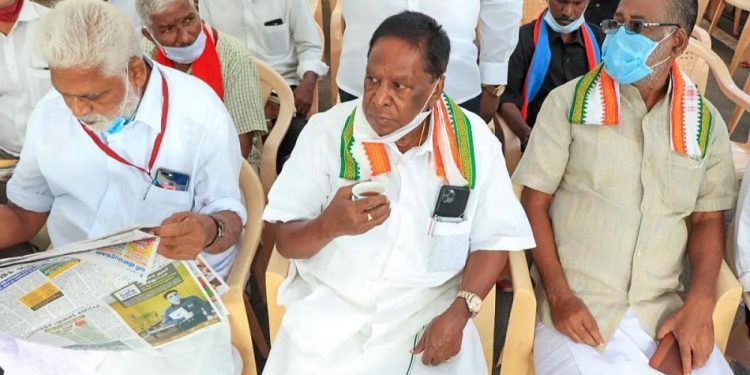Rup Narayan Das
The recent development in Pondicherry Legislative Assembly has once again brought to the fore the lacunae in the anti-defection law which needs to be fixed. In a democratic parliamentary polity changing party affiliation on part of the legislator who is elected from one political party to another subsequent to the election raises the issue of principles. If dissent is a legitimate democratic right, then the legislator shifting political loyalty is justified. But it is always a difficult task to draw the fine line between principle and political opportunism. When a legislator or a splinter group breaks away from the parent party and forms another political entity or merges with another party, it is preconceived as political opportunism, but if one looks from the other end of the spectrum, if the defecting legislator or the splinter group is not allowed to move on, then the denial stifles his democratic and political freedom.
With a view to regulating political defection, the Constitution of India was amended by the Fifty Second (Amendment Act), 1985 incorporating the Tenth Schedule in the Constitution which enumerated the provisions for disqualifications of members of legislatures, both Parliament and state legislatures on grounds of political defection. The statement of objects and reason in the Bill stated, “The evil of political defections has been a matter of national concern. If it is not combatted, it is likely to undermine the very foundations of our democracy and principles which sustain it…” But nowhere in the Constitution including the Tenth Schedule, has the term defection been defined. The Tenth Schedule, however, for the first time mentioned legislature party /political party in the Constitution.
As per the provisions of the Anti-defection Law, a member of the legislature is liable to be disqualified from the membership of the legislature by the Presiding Officer broadly on two grounds. In the first place if he ‘voluntarily’ gives up his membership of such political party; secondly if he votes or absents in the legislature to any direction issued by the political party to which he belongs or by any person or authority authorised by it in his behalf, without obtaining in either case, the prior permission of such political party, person or authority and such voting or abstention within fifteen days from the date of such voting or abstention. Over the years certain lacunae of the Anti-defection Law have come to the forefront. One such major congenital defect was the clause 4 of the original Anti-defection Law pertaining to provision relating to ‘split’, which was rampantly misused by the powers that be leading to unethical practice of ‘horse trading’. It was against this background that the provision relating to splits was deleted from the Tenth Schedule by the Ninety-first Constitutional Amendment Act, 2003. The amendment also provided for debarring the defecting legislators from holding ministerial or remunerative political posts unless re-elected to the legislatures. The amendment further stipulated that the total number of ministers in the council of ministers shall not exceed fifteen per cent of the total number of members of the legislature, both at the Centre and the State. The Anti-defection Law originally debarred courts in respect of any matter connected with the disqualification of a member of the legislature under the Tenth Schedule. This paragraph, however, has been held by the Supreme Court as ultra-virus of the Constitution in their majority opinion in Kihota Hollohon vs. Zachilhua & others in 1993 on the ground of its non-ratification by the state legislatures. The apex body of the all India Presiding Officers Conference in an emergent meeting held in 1992 unanimously agreed that in matters relating to Anti-defection Law before the courts, the Presiding Officers would furnish the records, if called for and respect the decisions of the Courts. They would, however, not subject themselves to the jurisdiction of the Courts. Thus, a very healthy convention has already been established in the relationship between the legislature and the judiciary. All these have certainly brought some degree of sanity in the narrative of our political discourse.
But still there are some grey areas which need to be addressed. Certain issues relating to the Anti-defection Law which have traction in view of the on-going political developments in Rajasthan can be flagged. A major drawback of the Anti-defection Law is the lack of precise definition of defection itself. Similarly, terms like voluntarily giving up party membership and political party have not been defined. The Anti-defection Law itself does not expressly take into account the activity of a legislator outside the legislature. Both the Presiding Officers and Courts have given their rulings and pronouncements on the basis of creative interpretation of the Law. As regards the issuance of ‘whip’, it may be mentioned that the Law Commission of India under the Chairmanship of Justice BP Jeevan Reddy in its 170th Report, inter-alia had observed “whips may be issued only when the voting in the House affects the continuance of the Government and not on each and every occasion. Such a course would safeguard both the party discipline and freedom of speech and expression of the members.”
The writer, a retired joint secretary of the Lok Sabha Secretariat, is a senior fellow of the Indian Council of Social Science Research at the Indian Institute of Public Administration, New Delhi. Views are personal.






































